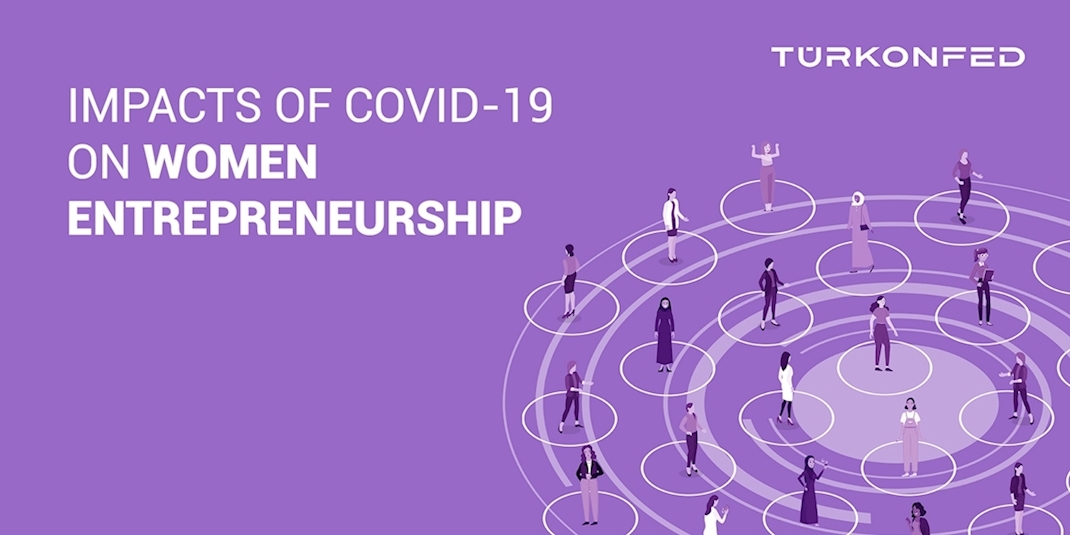TÜRKONFED has published a report to analyze how women entrepreneurs are affected by the pandemic, their future projections and expectations. According to the report titled “The Effects of Covid-19 on Women Entrepreneurship”, 84.3 percent of women entrepreneurs were adversely affected by the pandemic, and the rate of those whose turnover decreased increased by 2.5 times as compared to the previous year. While half of the entrepreneurs expect that they will end 2021 with a loss, 70.7 percent of them said they would have to close their businesses in 3 months to 2 years if the pandemic continues.
Half Of The Female Entrepreneurs Expect Booking Loss At The Year End

Having kept the pulse of the business world with its research and field studies during the pandemic, the Turkish Entrepreneurship and Business World Confederation (TÜRKONFED) has published a new report titled “The Effects of Covid-19 on Women Entrepreneurship”, which analyzes how women entrepreneurs from different regions of Turkey are affected by the pandemic, their future predictions and expectations. The report prepared by the TÜRKONFED Women in Business World (WBW) Commission revealed the difficulties experienced by women in the business world.
The turnover of 74.2 percent of women entrepreneurs decreased
84.3 percent of women participating in TÜRKONFED’s research stated that they were adversely affected by the pandemic. While the rate of participants who declared that their turnover decreased in 2019 was 28.3 percent, this rate increased 2.5 times to 74.2 percent in 2020. The percentage of those who say their turnover has increased compared to the previous year, on the other hand, decreased by two thirds from 2019 to 2020, from 44.4 percent to 14.6 percent.
Half of entrepreneurs think they will end the year with a loss
The continuation of the pandemic with new waves and variants caused women entrepreneurs to lose their hopes for the end of the year. While 45.5 percent of the enterprises participating in the research said that they closed 2020 with a loss, this rate increased to 50.5 percent in their predictions for 2021. While 23.7 percent of enterprises stated that they made a profit in 2020, this rate increased to 24.5 percent with a less than one point increase in the predictions for 2021.
If the pandemic continues, women entrepreneurs may close up
69.7 percent of women entrepreneurs stopped their activities, albeit temporarily, during the pandemic. 46.4 percent of businesses remained closed between 9-16 weeks. In the study, participants were also asked how long they could keep their businesses open if the pandemic continued. 10.6 percent of women entrepreneurs stated that they can last for a maximum of 3 months, 15.6 percent for 3-6 months, 26.1 percent for 6 months-1 year, and 18.6 percent for 1-2 years. According to this, while 70.7 percent of women entrepreneurs think that they may close up their businesses between 3 months and 2 years, the rate of those who say that their business will not be closed remained at 29.3 percent.
Recommendations from TÜRKONFED for the recovery process of women entrepreneurs
TÜRKONFED also made suggestions for overcoming the difficulties experienced by women entrepreneurs during the pandemic. These 12 recommendations are summarized as follows:
1- The common view of the research participants is that the economic measures taken during the pandemic were inadequate. Participants are of the opinion that decision processes involving relevant institutions and stakeholders and special support packages for women entrepreneurs will help them recover.
2- Women entrepreneurs expect a widespread and regular vaccination program to be implemented.
3- The implementation of policies by local governments to support innovative initiatives will both increase the interest in new entrepreneurship at the local level and support entrepreneurs.
4- The long-term policies of chambers and commodity exchanges, together with the components of the city and the region, will be an important support for sustainability.
5- Women entrepreneurs need to be developed in terms of technology. In this regard, it is an effective method in the first place that professional chambers, NGOs and municipalities offer their existing infrastructure to the service of women entrepreneurs.
6- Women entrepreneurs should be encouraged to carry out foreign trade activities. The government should provide tax advantages for women entrepreneurs and provide the necessary infrastructure and training services.
7- Women entrepreneurs should be encouraged and necessary economic and technical support should be provided for the transition from sectors that have become structurally dysfunctional due to the pandemic to other sectors. In this regard, local governments, NGOs, chambers and exchanges should work in cooperation.
8- Even if there are institutions and organizations that support women entrepreneurs, communication with these organizations is not seen as strong enough among women entrepreneurs. Improving this communication and cooperation will have an empowering effect.
9- In order to alleviate the increasing workload and to increase the motivation of the employees, free guidance services should be provided to the enterprises by the municipalities and professional chambers.
10- It would be beneficial to explain the support packages in which the conditions for women entrepreneurs are further stretched by the government and to facilitate their access to psychological guidance.
11- It is understood that there is a need for awareness studies that will equalize the domestic work balance of women entrepreneurs and their employees from the social gender perspective. In this context, all stakeholders, from the government to women entrepreneurs themselves, should work to increase this awareness in proportion to their capacities.
12- Both employers and working women need to be supported regarding remote working processes.